« May 2007 | HOME PAGE | July 2007 »
June 30, 2007
Pity the Pickpockets
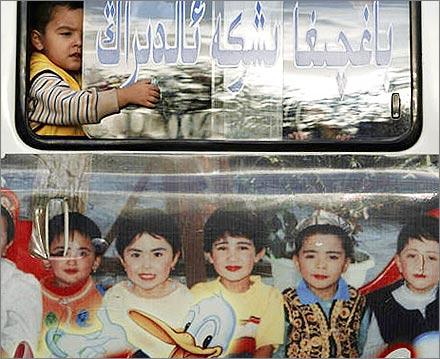
Hong Kong-based Phoenix Weekly magazine has written a story about those shifty-eyed Uyghur children often seen lurking in the dark corners of China's eastern cities. It turns out that most of the children aren't pickpocketing by choice, but like those brick kiln child slaves recently discovered in Shanxi, have been forced or tricked into their current situation. At least 4,000 Uyghur children are missing, according to China's Ministry of Civil Affairs, with many living out a modern-day version of Oliver Twist:
A boy who has escaped to a government temporary welfare shelter explains: "We have 16 adults and four children in our gang, living together in a very hard place to find. The adults all carry knives, and train the children how to steal, then threaten people who we steal from, if they complain.
"They force us to pick up coins from boiling water as part of our training to snatch things quickly. If we miss the coin, they beat us with a belt. One 11-year-old boy tried to run away, but he was caught and almost beaten to death."
The "big brothers", or Fagins, who run the gangs set the children daily targets, from about $100 to $350, to hand over. If they fail, they are beaten. The Fagins extend their control by getting the children addicted to drugs, and by sexually harassing the girls. A child trained to steal, can be sold for $1000.
So, the next time your wallet gets swiped outside the Panjiayuan market, don't beat yourself up. Those little buggers could've grabbed your cash even if your pocket had been filled with molten lead!
More seriously, though, this and other stories of enslavement are a reminder that China still has a lot of progress to make in just about every aspect of development. Of course, poor minorities get a raw deal one way or another just about everywhere in the world... but I digress.
Does anyone out there have a translation of the original Phoenix Weekly article? You can read the The Australian's coverage of the report below.
P.S. I've never personally had my pocket picked, neither by a Uyghur nor any other person. A pickpocket had his hand on my mobile phone once when I was on the bus here in Korla, but he backed off when I felt him trying to remove it. I've heard some great stories, though! Anyone care to share?
Stolen ethnic minority kids victims of Chinese `Fagins'
ROWAN CALLICK, CHINA CORRESPONDENT
27 June 2007
The Australian
FOLLOWING the freeing of a thousand children held as slave workers in brick kilns in China, a new report reveals a nationwide network of Fagins living off more than 4000 stolen children trained to steal and beg.
A boy who has escaped to a government temporary welfare shelter explains: "We have 16 adults and four children in our gang, living together in a very hard place to find. The adults all carry knives, and train the children how to steal, then threaten people who we steal from, if they complain.
"They force us to pick up coins from boiling water as part of our training to snatch things quickly. If we miss the coin, they beat us with a belt. One 11-year-old boy tried to run away, but he was caught and almost beaten to death."
The "big brothers", or Fagins, who run the gangs set the children daily targets, from about $100 to $350, to hand over. If they fail, they are beaten. The Fagins extend their control by getting the children addicted to drugs, and by sexually harassing the girls. A child trained to steal, can be sold for $1000.
These children are Uighurs, members of the Turkic "ethnic minority" who comprised 90 per cent of the population of Xinjiang in China's northwest when the People's Republic was formed in 1949.
Today, the Uighurs, Indo-European Muslims, are a minority -- just 45 per cent -- of the total population of 20 million in their own land, whose area is double that of NSW and a sixth that of all China. The Han majority in Xinjiang enjoy a considerably higher average income, recently boosted by the oil and gas piped from the region to the energy-hungry east of China.
Hong Kong-based Chinese language magazine Phoenix Weekly has compiled a report that, like the investigative work of Fu Zhenzhong of Henan TV who "broke" the story of the slave children in Shanxi province, also reveals aspects of the grim underworld that has grown alongside China's surge towards modernity and wealth.
Phoenix cites the Xinjiang regional Government's welfare agency as estimating that 4000 Uighur children are missing, lost somewhere in China's great interior while 3660 managed to find their way home from abductions in the three years until 2006.
The Xinjiang Academy of Social Science says its research shows that more than 90 per cent of the children who are missing have been forcibly abducted or tricked away from their homes.
The national Ministry of Civil Affairs that provides welfare throughout China says that 13 per cent of all the children for whom it provides assistance are Uighurs, even though they comprise just 0.77 per cent of the population.
The number of Uighur children abducted is likely to be far higher than 4000, says Phoenix because that figure only includes children with whom the official agencies have come into contact.
Staff in the post office in Hetian, another Xinjiang city, in the poverty-stricken south, say: "Money is transmitted from all over the country to villages every day" comprising the "cut" from the children's earnings, flowing to the traffickers and sometimes even to their own families.
"Some local officials shut their eyes to this phenomenon, hoping the thefts can earn money for their areas," says Xu Xifa of the Xinjiang Academy of Social Science.
But often the children abducted were too young to remember where their home was so it becomes very difficult to restore them to their families.
Other times, when the children are freed, one volunteer tells Phoenix, "the traffickers come to claim them, insisting they are the parents or other relatives".
The children, who look quite distinct from the majority Han Chinese, are usually told not to speak Chinese, and to threaten to harm themselves, if they are caught by police. They are usually let go, and often, says Phoenix, and "big brother" is waiting for them outside the police station.
Throughout China, vigilantes regularly post photos of Uighur child thieves online, calling on the police to crack down on them. Others seek to help the children only to see them handed back to traffickers parading as relatives.
posted June 30, 2007 at 09:33 AM unofficial Xinjiang time | Comments (62)
June 27, 2007
A Day on the Farm
As many of you know, my business here in Xinjiang involves frequently cooperating with various arms of the bingtuan (兵团), aka Xinjiang Production & Construction Corps (XPCC), aka the "army farm" system. (I think "XPCC" works best ― its vagueness as a term mirrors the imperfect clarity with which the system can be described ― but I still find myself using "bingtuan".)
Getting along with the bingtuan is big part of creating a successful agriculture-based business out here, like making friends with the Nevada Gaming Commission is a must for casinos in Vegas. No matter what you may have heard about the collective farms in the past, though, today they're pretty much just farms. And just like farms all over the world, every minute is another chance to capture a moment of rural bliss:
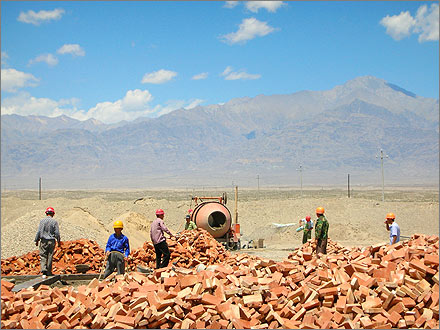
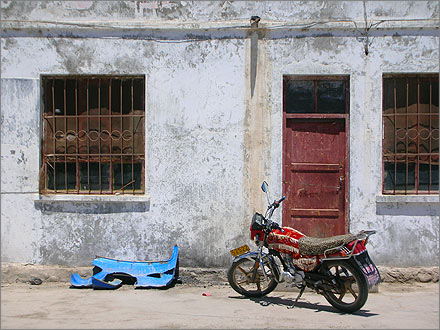
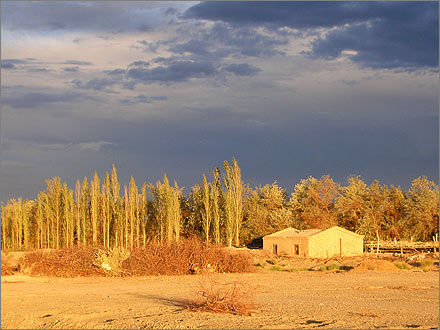
I shot the images above over the past twenty-four hours on a tuanchang (corps farm) about an hour's drive north of Korla. Place your cursor over each image for a short caption.
Oooh, look! A bingtuan map for all you enthusiasts out there.
posted June 27, 2007 at 10:01 PM unofficial Xinjiang time | Comments (17)
June 22, 2007
Flickr Returns?
Is it just me or have the Flickr image servers been unblocked in China? Let me know if you can see my mobile photos at the top of the front page and where in China you're visiting from.
posted June 22, 2007 at 12:39 AM unofficial Xinjiang time | Comments (34)
June 21, 2007
Hydrogen Bomb Souvenirs
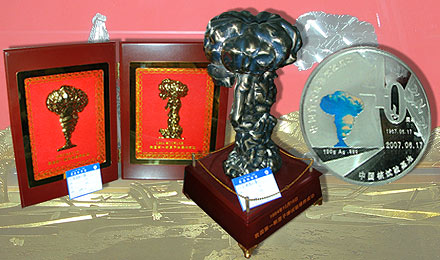
The 40th anniversary of China's first hydrogen bomb test came and went this week without much fanfare. Even here in Korla, where the Lop Nur test site is practically next door, there was little in the way of remembrance. Of course, the city ― nay, the entire region of Xinjiang ― was little more than a collection of mud huts at the time. The only people likely to remember anything to do with the explosion are local Uyghurs, but I imagine that they're none too keen on either hydrogen bombs exploding in their homeland or the subsequent population explosion of Han migrants. What gives?
Even Xinhua was fairly restrained in their coverage of the anniversary. I liked this passage of the article, though, where an old engineer talks about conditions in the good ol' days:
More than 10,000 people worked at the base and natural disasters in other parts of the country in the early 1960s made it difficult to get enough food for his crew, Wang said.
"We lived in cave dwellings, ate qingke barley (a highland barley grown in Tibet and Qinghai), and our only vegetable was cabbage. When there was not enough food, we had to search for edible wild herbs to feed ourselves," Wang added.
Yes, natural disasters. Hmmmmm. Is that what they're calling the Great Leap Forward and the Cultural Revolution these days?
Anyway, I did manage to find some awesome atom bomb souvenirs at the local post office (pictured above) celebrating both China's first nuclear explosion in 1964 and the first H-bomb on June 17, 1967. I'm totally gonna buy that sculpture of a mushroom cloud for the desk in my new office! (Speaking of which... what's the deal with China's obsession over cheesy metallic desktop statues?)
You can see video of China's first hydrogen bomb test here, although I think the footage from China's first nuclear explosion is much more exciting. Those gas-mask wearing soldiers riding on horseback towards the mushroom cloud while firing machine guns are so bad-ass! The Xinhua article is posted below.
China commemorates 40th anniversary of first test of hydrogen bomb
17 June 2007
Xinhua News Agency
BEIJING, June 17 (Xinhua) -- Chinese scientists Sunday commemorated the 40th anniversary of the country's first test of a hydrogen bomb, and called for greater self-confidence and self-reliance in the development of new high-technologies.
China's first hydrogen bomb was tested in the desert of west China's Xinjiang Autonomous Region on June 17, 1967.
The successful test startled the world as it took only two years and eight months for China to develop the hydrogen bomb after it tested its first atomic bomb in October, 1964, said Li Yingxiang, former head of the general office of the Ministry of Nuclear Industry.
Seventy-year-old Wang Jingheng, former head of China's first nuclear weapons research and production base in northwest Qinghai Province, recalled their tough conditions at the base more than 40 years ago.
More than 10,000 people worked at the base and natural disasters in other parts of the country in the early 1960s made it difficult to get enough food for his crew, Wang said.
"We lived in cave dwellings, ate qingke barley (a highland barley grown in Tibet and Qinghai), and our only vegetable was cabbage. When there was not enough food, we had to search for edible wild herbs to feed ourselves," Wang added.
Li urged today's Chinese leaders and scientists to have the same confidence as those working on the bomb did four decades ago.
"Remembering the history of developing the first hydrogen bomb is of great significance to today's scientific research," said Li.
"While Chinese researchers have much better conditions and work in an international environment, the spirit of self-reliance and arduous struggle, should be carried on," Li said, adding that "China must develop its own high-tech with our own intellectual property right."
Kang Rixin, general manager of China National Nuclear Corporation, said: "Learning from the experience of developing China's first atomic and hydrgen bombs, we should mainly rely on ourselves for the development and innovation of key nuclear technologies."
Compared with developed countries, China's nuclear power generating industry is still small scale and at a relatively low level, Kang said.
"We should shoulder the historic responsibility to develop the basic and key technologies of the nuclear power industry," Kang added.
posted June 21, 2007 at 09:32 AM unofficial Xinjiang time | Comments (42)
June 19, 2007
Siberia's Wannabe Israel

Alright, so this is a bit off-topic. But I was reading through the day's Xinjiang-related news items this morning when I came across a story about China's land ports with Russia. Turns out that there are plans to build a bridge across the Heilong River to connect northeast China with southeast Siberia. And I quote...
Meanwhile, after years of discussion, it is believed that substantial progress may be achieved in the near future in the building of a railway bridge over the Heilong River, which borders the two nations.
Valery Solomonovich Gurevich, government vice-chairman of Russia's Jewish Autonomous Region, said that China and Russia will start construction of the first railway bridge over the Heilong River (called Amur in Russia) at the end of this year.
The bridge will link Nizhneleninskoye in the Jewish Autonomous Region with Tongjiang in Heilongjiang Province.
The 2,197-m long bridge, with an estimated investment of nearly $230 million by Russian mine group Aricom, is expected to be completed by the end of 2010, Gurevich said.
Now, I'm very familiar with autonomous regions here in China... heck, I live in one. Seems like just about every minzu has got a piece of land with their name on it (which is just about where the "autonomy" ends). But a Jewish Autonomous Region dedicated to my own peeps? That's something special, even if it's in Russia.
Never mind that the population is less than 2% Jewish. Or that it's got a weak coat-of-arms and the least heterosexual flag ever designed. (Could you imagine Israeli tanks covered in rainbows?) Or that Jews didn't even want the place. The fact that the region even exists is a testament to Stalin's greatness. I mean, what better place to protect the Jews you aren't killing than the coldest, super-remote butt-end of Siberia?
You gotta love communism! The full article is below.
PROPOSED BRIDGE TO BOOST BILATERAL TRADE
By Jia Bian
19 June 2007
China Daily
China and Russia should work together to expand the handling capacity of their on-land border ports, given the rapidly growing economic and trade ties between them, officials from both countries said.
Speaking at the ongoing 18th China Harbin Fair for Trade and Economic Cooperation, Wang Limin, vice governor of Heilongjiang Province, said speeding up the construction of facilities and streamlining customs procedures of border ports were imperative criteria for trade growth.
Located in Northeast China, Heilongjiang shares a border of over 3,000 km with Russia.
Vice Governor Wang said that an economic belt along the Sino-Russian border has come into shape as a result of the boom in bilateral trade over the past decade.
Statistics show that Heilongjiang, Jilin and Liaoning provinces of Northeast China, the Inner Mongolia Autonomous Region of North China and Northwest China's Xinjiang Uygur Autonomous Region together account for almost one third of the country's trade volume with Russia, and Heilongjiang leads the pack with about one fifth of the total trade volume with the former Soviet Republic.
The province has 15 on-land port cities facing Russia, which is 70 percent of the total such ports in the country.
Bilateral trade volume soared from $6.83 billion in 1996 to $33.4 billion last year, making Russia the eighth largest trading partner of China.
In order to further facilitate trade growth, China has taken steps to expand the transportation facilities of its land ports with Russia.
The Manzhouli port city in Inner Mongolia Autonomous Region now handles more than 60 percent of the cargo traded with Russia.
A multi-billion-yuan project to build more railway lines to enhance its cargo handling capacity is under way, which is expected to double the current volume to 40 million tons a year.
Meanwhile, after years of discussion, it is believed that substantial progress may be achieved in the near future in the building of a railway bridge over the Heilong River, which borders the two nations.
Valery Solomonovich Gurevich, government vice-chairman of Russia's Jewish Autonomous Region, said that China and Russia will start construction of the first railway bridge over the Heilong River (called Amur in Russia) at the end of this year.
The bridge will link Nizhneleninskoye in the Jewish Autonomous Region with Tongjiang in Heilongjiang Province.
The 2,197-m long bridge, with an estimated investment of nearly $230 million by Russian mine group Aricom, is expected to be completed by the end of 2010, Gurevich said.
However, construction is yet to begin, as the countries still need to smooth out some project details.
Another proposed plan for a bridge over the river, connecting Heihe of Heilongjiang and Blagoveshchensk of Amursk in Russia, has been under discussion for about 15 years.
Stanislav Muravskiy, consul-general of the Consulate General of the Russian Federation in Shenyang, the capital of Liaoning, said that no matter where the bridge is built, it will be conducive to the development of bilateral relations since the two countries need more transport links.
Muravskiy added that the Tongjiang-Nizhneleninskoye bridge might become reality if the plan could be more convincing regarding its expected contribution to economic growth.
"The continuous increase of cargoes between the two countries means that we need more railway passages, which should be a transportation artery that can bring long-term mutual economic benefits," he said.
If the bridge fits the requirements, it will be possible for it to be set up in two years, as funds are no longer a problem for either country, he noted.
Cargo transportation between the two countries currently relies mainly on railway routes at three major on-land ports in Manzhouli of Inner Mongolia and Suifenhe in Heilongjiang.
The construction of a bridge across the Heilong River will create much shorter route.
posted June 19, 2007 at 08:36 PM unofficial Xinjiang time | Comments (39)
June 18, 2007
Eat Meat.
It's that time of year again: the intense desert sun beats down upon Korla, the Kongque River's cool waters refresh the weary, and roasted meats fill our bellies. Some of you may remember the photos from my favorite swimming spot that I posted last summer. This year, an enterprising Uyghur family has set up shop on the opposite bank of the river... a great place to relax under the trees, have a meal, drink a few beers, and go for a dip in the river. The meat, especially the roasted chicken, is incredible.
Who knew that a nan oven could be so versatile? If I ever get some land of my own out here I'll definitely have one built for me. Perhaps the "roastmaster" from yesterday's feast can give me a few tips...
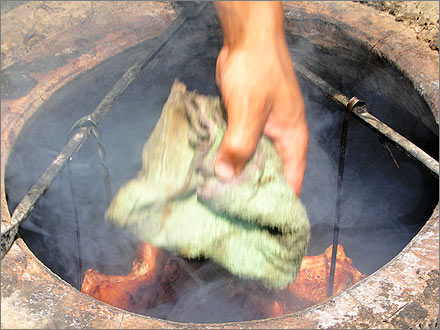
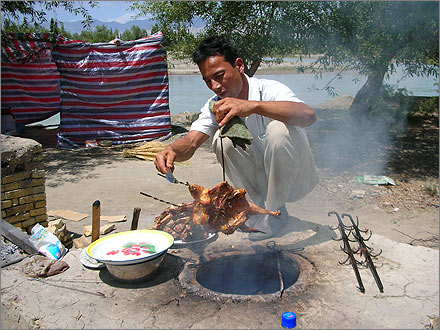
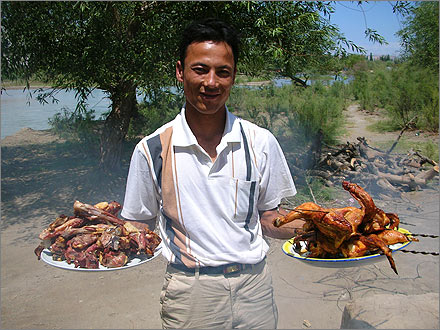
Those little kebabs you get from Uyghurs all over China are strictly for beginners. Advanced consumers of roasted meats - like myself - can only be satisfied by the work of a true artiste.
Yakhshi!
posted June 18, 2007 at 01:12 PM unofficial Xinjiang time | Comments (33)
June 10, 2007
Rot in Albania or Die in China?
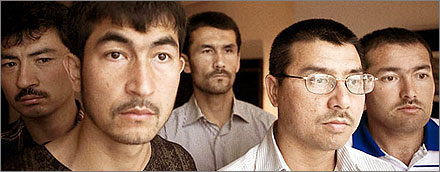
There's a fairly lengthly article in today's New York Times about the plight of five Uyghurs who were allowed to leave Guantanamo for Albania last year. Turns out that life in Albania ain't all peaches and cream:
They have now lived for more than a year in a squalid government refugee center on the grubby outskirts of Tirana, guarded by armed policemen.
The men have been told that they will need to get work to move out of the center, they said, but that they must learn the Albanian language to get work permits. For now, they subsist on free meals heavy with macaroni and rice, and monthly stipends of about $67, which they spend mostly on brief telephone calls to their families. But some of the men have already lost hope of ever seeing their wives and children again.
“We suffered very much at Guantánamo, but we continue to suffer here,” Mr. Basit said. “The other prisoners had their countries, but we are like orphans: we have no place to go.”
There's no obvious solution to their problem, as a return to China would most likely result in, errr, discomfort of an extreme nature. I think they should have been allowed to live in the US, but Homeland Security flat out refused. Perhaps what's needed is some sort of new Australia, where we can send these people until there's enough of them to start their own government.
The article gives more details about life at Gitmo for these unlucky five:
They described their imprisonment as bewildering and traumatic, punctuated by moments of the absurd. After they were cleared for release, they were able to watch cartoons and Harry Potter movies, until Mr. Mamet smashed the television because of what he said was the guards’ refusal to take him to a doctor. The set was replaced with one made in China, the men said dismissively; it broke after a week.
Several of the Uighurs said their most traumatic experience at Guantánamo was their interrogation by a team of Chinese security officials in September 2002. The Chinese “had all of our files from the Americans,” Mr. Qassim said, threatened them repeatedly and insisted that the prisoners return with them to China. They refused.
Woe is them, eh? Of course, one could argue that they shouldn't have been hanging around with Taliban-types playing with AK-47s, but that's all academic now. You can read the full article below.
Chinese Leave Guantánamo for Albanian Limbo
The New York Times
By TIM GOLDEN
Published: June 10, 2007
TIRANA, Albania — Ahktar Qassim Basit says he is not angry about the four years he spent as an American prisoner at Guantánamo Bay, Cuba, before his captors mumbled a brief apology and flew him to this drab Balkan capital to begin a new life as a refugee.
It is this new life in Albania, Mr. Basit and other former Guantánamo detainees say, that is driving them to desperation.
The men, Muslims from western China’s Uighur ethnic minority, were freed from their confinement in Cuba after they were found to pose no threat to the United States. They have now lived for more than a year in a squalid government refugee center on the grubby outskirts of Tirana, guarded by armed policemen.
The men have been told that they will need to get work to move out of the center, they said, but that they must learn the Albanian language to get work permits. For now, they subsist on free meals heavy with macaroni and rice, and monthly stipends of about $67, which they spend mostly on brief telephone calls to their families. But some of the men have already lost hope of ever seeing their wives and children again.
“We suffered very much at Guantánamo, but we continue to suffer here,” Mr. Basit said. “The other prisoners had their countries, but we are like orphans: we have no place to go.”
Mr. Basit and four other men here, who spent time at a hamlet in Afghanistan run by Uighur separatists, are still considered terrorist suspects by China’s Communist government. Only Albania’s pro-American government would give them asylum, but Albanian officials have since told the men they cannot afford to give them much else.
Things could be worse, the former prisoners note. At least 15 of the 17 Uighurs who remain at Guantánamo have also been cleared for release, but not even Albania will accept them — and neither will the United States. Instead, American diplomats say they have asked nearly 100 countries to provide asylum to the detainees, only to find that Chinese officials have warned some of the same countries not to accept them.
“The United States has made extensive and high-level efforts over a period of four years to try to resettle the Uighurs in countries around the world,” the State Department’s legal adviser, John B. Bellinger III, said in an interview. Its lack of success, he added, “has not been for lack of trying.”
Many American officials privately describe the Uighurs’ plight as one of the more troubling episodes of the Bush administration’s detention program. The case also provides a view of the remarkable difficulties Washington has encountered in trying to winnow the detainee population at Guantánamo in response to domestic and international criticism.
The refugees in Tirana seem to have little sense of how to influence the global chess game in which they have become involved. They spend most of their days behind the refugee center’s high, cinderblock walls, reading the Koran, studying Albanian and waiting for a turn on the center’s lone desktop computer. They avoid the gravelly soccer field because it reminds them of one they looked out on at Guantánamo.
With President Bush scheduled to visit Albania on Sunday, the Uighurs and three other former Guantánamo detainees here are also asking whether the United States, having flown them here in shackles, might do anything to help get them the housing, jobs and other support they have been told to expect.
One morning in mid-May, the five Uighurs (pronounced WEE-gurs) got permission to leave the refugee center, rode buses downtown and trooped to the offices of the Albanian prime minister, Sali Berisha. An aide said Mr. Berisha was too busy to see them, but promised to pass along their entreaties.
“We said, if you can’t deliver what you have promised, please ask George W. Bush to find another country for us,” another of the former prisoners, Abu Bakker Qassim, recalled.
Officials of the Albanian Interior Ministry, which is responsible for the refugees, declined to comment on their treatment.
The 22 Uighurs who ended up at Guantánamo were part of a group of about three dozen Uighur men who were staying at a hamlet in the White Mountains of eastern Afghanistan, not far from Tora Bora, when United States forces began bombing the area in October 2001.
Most of the five Uighurs in Tirana said they had left their homes in China’s far-western Xinjiang Province, an area the Uighurs call East Turkestan, to earn more money for their families and escape government harassment. They said they drifted into Afghanistan after travels through other Central Asian countries, and heard that the Uighur hamlet was a place where they could get free food and shelter while trying to figure out where to go next.
The youngest, Ayoub Haji Mamet, who was 18 when he was captured, had a quixotic plan to make his way across Europe and then fly to the United States to attend school.
International human rights groups have long accused the Chinese authorities of oppressing the roughly nine million Uighurs in Xinjiang, where there have been occasional acts of separatist violence. The State Department’s own 2006 human rights report for China describes ethnic discrimination, the suppression of Muslim religious freedom and the persecution of those thought to be separatists, many of whom have been executed.
Pentagon officials have described the Uighur hamlet in Afghanistan as a separatist training camp that was at least loosely aligned with the Taliban. Lawyers for the men dispute that characterization. But in interviews, the Uighurs in Albania described a tiny, primitive outpost run by secretive members of some sort of Uighur liberation group.
The men who arrived there were given chores to do and beans to eat. Most of them were assigned aliases and shown how to fire an old AK-47 assault rifle, the only weapon they saw. One American intelligence official said that some of the Uighurs still at Guantánamo received more extensive training. The leader of the hamlet, a man called Abdul Musin, told visitors that they could stay on if they wanted to “liberate” other Uighurs, the men said, but that they were also free to go.
“We do not know if he belonged to any group,” said Mr. Qassim, 38, the oldest of the five detainees. “We were not allowed to ask any questions.”
In mid-October of 2001, American planes bombed the Uighur hamlet, killing at least one man and sending the rest fleeing over the mountains into Pakistan. Villagers there sheltered and fed the Uighurs but then betrayed them to local security forces, which turned them over to the United States military.
By June 2002, nearly all the Uighurs had been sent from military detention centers in Afghanistan to Guantánamo. They described their imprisonment as bewildering and traumatic, punctuated by moments of the absurd. After they were cleared for release, they were able to watch cartoons and Harry Potter movies, until Mr. Mamet smashed the television because of what he said was the guards’ refusal to take him to a doctor. The set was replaced with one made in China, the men said dismissively; it broke after a week.
Several of the Uighurs said their most traumatic experience at Guantánamo was their interrogation by a team of Chinese security officials in September 2002. The Chinese “had all of our files from the Americans,” Mr. Qassim said, threatened them repeatedly and insisted that the prisoners return with them to China. They refused.
But American intelligence personnel at Guantánamo soon began to doubt that most of the Uighurs represented a real terrorist threat, officials who served there said. By late 2003, senior national security officials in Washington cleared most of the Uighurs for release — 14, by one official’s count.
Some officials at the Pentagon advocated sending the Uighurs back to China, and the State Department eventually sought and received assurances from the Chinese that they would treat the men humanely. But senior officials finally decided not to repatriate them, citing China’s past treatment of the Uighur minority.
The State Department began approaching both Muslim countries like Turkey and those with small Uighur communities, like Germany and Sweden. However, the search was interrupted in September 2004, when the Pentagon set up panels at Guantánamo to decide whether the prisoners there, including the 22 Uighurs, were being rightfully held. Although most of the Uighurs had already been cleared for release, the review panels found that all but six were in fact enemy combatants.
The boards were told to review the Uighur cases again, officials said. This time, they found that only five could be freed. (Subsequent annual reviews have cleared 15 of the 17 remaining detainees.)
The State Department then began casting its net more widely. One prospect was the west African republic of Gabon, which has a small Muslim minority. Gabon’s long-ruling president, Omar Bongo, said he was open to accepting the Uighurs. But according to two officials, he wanted not only compensation for resettling the refugees, but support for international loans to his government and a meeting with President Bush at the White House. He had already had one such meeting just months earlier, on May 26, 2004.
American diplomats said they had contacted governments from Angola to Switzerland to Australia. Increasingly, though, they have seen the shadows of their Chinese counterparts.
“The Chinese keep coming in behind us and scaring different countries with whom they have financial or trade relationships,” said one administration official, who insisted on anonymity in discussing diplomatic issues.
A spokeswoman for the Chinese Embassy in Washington said her government would not discuss its specific diplomatic efforts regarding the Uighurs. But in a statement, the embassy described the Uighurs at Guantánamo as “suspects of the ‘East Turkestan’ terrorist forces which constitute part of international terrorist forces,” and it said they should face justice in China.
Beijing’s ambassador to Albania has met at least three times with Mr. Berisha, the prime minister, to demand the Uighurs’ repatriation, Albanian officials said. Albania has since told Washington it cannot accept any more of the Uighur detainees.
“But we helped as much as we could,” the Albanian foreign minister, Lulzim Basha, said in an interview.
American officials said China has also been active in Germany, which has heard appeals about the Uighurs from high-level White House and State Department officials, as well as international human rights groups.
“One of the problems we’ve encountered is that they say, why doesn’t the U.S. take some of these people?” said Kenneth Roth, the executive director of Human Rights Watch, who has lobbied European governments to accept some of the Uighurs and other Guantánamo detainees.
American officials said they considered that idea. But two officials said it was shot down in 2005 by the Department of Homeland Security, which argued that the men would be barred from entering the United States under the Immigration and Nationality Act because they had been linked to a terrorist group or received “military-type training” from a group that engaged in terrorism.
Although American officials said they had compensated the Albanian government generously for taking the refugee, American diplomats in Tirana have paid little attention to the fate of the five Uighurs and the three other former Guantánamo detainees here, an Egyptian, an Algerian and an Uzbek.
“We’ve never talked to them,” said an American official who insisted on anonymity because she was not authorized to discuss the matter. “We don’t monitor them. They’re not our citizens, and there is no reason for us to.” The official attributed the shortcomings of the Albanian resettlement effort to “routine bureaucratic problems.”
The Tirana representative of the United Nations High Commissioner for Refugees, which has helped to organize and finance the refugee program in Albania, sounded more frustrated with the slow pace of resettlement.
“The government of Albania agreed to provide asylum to these people,” the official, Hossein Kheradmand, said. “We are not talking about 5,000 or 6,000 people; we are talking about eight people.”
The detainees have tried to fend for themselves. Mr. Mamet, the only one of the Uighurs who is single, found a young Albanian Muslim woman to marry but the arrangement collapsed when he could not move out of the refugee center. The others seem torn between longing for their families, who may never be able to leave China, and hope that they might someday start over.
After what they said had been endless promises of help from Albanian officials, they asked late last year to be moved to another country. They were told that because they were in a “safe” country, the United Nations could not relocate them. And anyway, no other country would have them. Lately, they have considered a hunger strike, a protest method they sometimes used in Cuba.
“After four and a half years, we thought we had escaped from Guantánamo, but we are still living under that shadow,” Mr. Qassim said. “Sometimes we think it would be better to go die in our homeland than to stay here.”
Raymond Bonner contributed reporting from Washington.
posted June 10, 2007 at 11:06 AM unofficial Xinjiang time | Comments (52)
June 07, 2007
Dubya & Rebiya Sittin' in a Tree
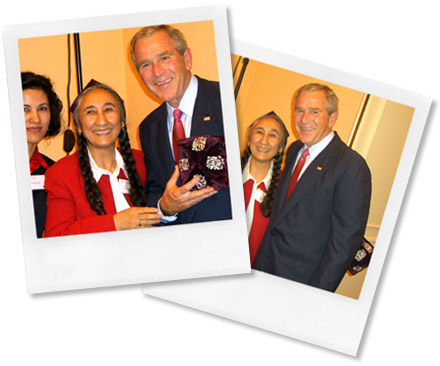
Say, who's that handsome feller pawin' the nifty Uyghur beanie? Well if it ain't George W. Bush!
For those of you who don't know, the world's spreader of freedom-in-chief met with exiled Uyghur leader Rebiya Kadeer in Prague on Tuesday. I didn't think I'd ever see a photo of a US president posing with a Uyghur doppa... but I've been proved wrong. Now, if he had only tried the thing on, that would have been a photo.
I don't have any particular insight to add to this story, so I'll just give you the facts straight. (I'm a straight-shooter, y'see?) Bush said this:
Another dissident I will meet here is Rebiyah Kadeer of China, whose sons have been jailed in what we believe is an act of retaliation for her human rights activities. The talent of men and women like Rebiyah is the greatest resource of their nations, far more valuable than the weapons of their army or their oil under the ground. America calls on every nation that stifles dissent to end its repression, to trust its people, and to grant its citizens the freedom they deserve.
Here are the President's full remarks. In response, China Foreign Ministry spokeswoman Jiang Yu said this:
Rebiya Kadeer is an out-and-out criminal. US behaviour is crude meddling in China's internal affairs, and we express our strong dissatisfaction and opposition.
Predictably, the meeting isn't being publicized here in Xinjiang. A Uyghur friend of mine who is more or less in-the-know was completely surprised when I asked if he'd heard the news. He grinned as I told him, and his first response was, "Wow, that's amazing news! I can't believe it."
posted June 07, 2007 at 11:57 PM unofficial Xinjiang time | Comments (41)
June 04, 2007
Comparative Literature
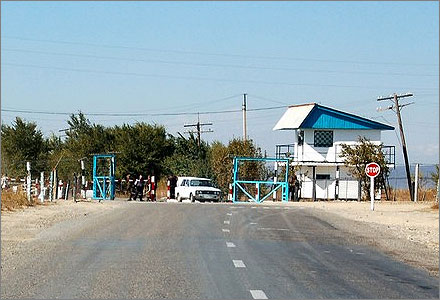
Two unrelated items today...
First, a "dispatch" that caught my eye in the China Economic Review. The article is about China's warming relationship with Central Asia, both politically (through the Shanghai Cooperation Organization) and physically (through programs like the Silk Road Initiative). The unnamed author pushes the idea that Central Asia's "legacy of science and engineering", when combined with China's booming economy, "poor masses", and relatively low level of corruption will allow for "high-value manufacturing in regions such as Xinjiang, which have so far relied on agriculture and energy extraction." What's so bad about agriculture, anyway? It does fine by me.
The part that caught my eye, though, was this:
The Silk Road Initiative and the SCO both offer China a basis for a new, mutually beneficial relationship with Central Asia. Either could end up looking like the EU, which through trade integration and better infrastructure has turned poorer member states like Ireland and Spain (and now, Poland) into economic tigers.
Better roads, less bureaucracy and more cohesion in economic development policies could deliver similar benefits to China and Central Asia.
Now, I agree with that last bit... but for anyone who's ever waited six hours to cross the border between Kazakhstan and China, the idea that the SCO will be anything like the EU anytime soon (or not soon) is laughable. Then I remembered a characterization I'd read on Registan of a certain David Gosset, whose recent article on Xinjiang and Central Asia has suffered much derision:
Gosset perceives Central Asia as a kind of emerging EU, a place where great power rivalries are largely a thing of the past, that the Russian's certainly took a walloping when the Soviet Union collapsed and the Chinese never left, which is all for the better...
So, who is this mysterious Chinese Economic Review writer with a decidedly EU-centric view of the SCO? Could it be David Gosset? Should this questions be of even remote interest to anyone without an unhealthy obsession to keep his blog filled with Xinjiang related material?
Second, a picture-perfect example of how one media outlet can spin a story one way, while another spins in exactly the opposite direction. You may or may not have heard that China is in the process of drafting an anti-terrorism law. We can only hope that China's legislation will be as popular and effective as similar efforts in the United States (see: USA Patriot Act). As much as al-Qaeda is part of any discussion about terrorism in the US, so are Uyghur separatists the focus of terrorism talk in China.
Here's how China Daily summarized the terrorist threat in Xinjiang:
ETIM, which is believed to be connected to Al-Qaida according to the Xinhua News Agency, plotted more than 200 violent incidents including explosions, assassinations, arson attacks, poisonings and assaults in Xinjiang and overseas between 1990 and 2001, killing 162 people and injuring 440, official data shows.
Jean-Paul Laborde, chief of the terrorism prevention branch of the United Nations Office on Drugs and Crime, said: "Terrorism is an international concern and no country is 100 percent safe."
That's an interesting quote from Mr. Laborde, but what's it got to do with the story? It certainly suggests, however, that China's domestic fight is part of the international effort to combat terrorism. And China Daily using Xinhua as a source to back-up facts? My mother's first son told reporters, "That's just plain silly."
Here's what the Associated Press said in their version of the story:
The Beijing leadership has faced simmering separatist movements in its border provinces and has tried to link a rebellion in its heavily Muslim Central Asian region of Xinjiang to al Qaida-connected groups.
Beijing has accused one group, the East Turkestan Islamic Movement, of killing nearly 200 people in Xinjiang since 1990.
Foreign experts and diplomats, however, have criticized Beijing for using the war on terror as an excuse to crack down on peaceful pro-independence activism.
They say many of the deaths were not separatist-related and that most bombings and other anti-government violence are carried out by individuals or small groups, not an organized movement.
Oh, diss! I think China Daily and the AP are gonna have to fight it out in the schoolyard. You can read all of the articles below.
By the way, did you know that USA Patriot is actually an acronym? What sick government-employed #$%! actually came up with "Uniting and Strengthening America by Providing Appropriate Tools Required to Intercept and Obstruct Terrorism"?
I can just imagine W's face lighting up when he heard that one. "Ashcroft, you're friggin' awesome! This war on terror is gonna be no problemo."
Dispatches
1 June 2007
China Economic Review - Industries Updates
It's obvious to anyone crossing from western China into Kazakhstan or Kyrgstan that you're entering another world. The traffic jams, billboards and smooth highways are replaced on the Kazakh side by long queues at immigration and little sign of economic activity on the bumpy road to Almaty, the commercial capital. Central Asia's problems are many. Government remains stuck somewhere in between the centralized economies of the Soviet era and a free market system which can efficiently exploit the region's mineral and other wealth for the benefit of its people. They have so far seen little profit from the region's much talked-of oil and gas.
Next door, China is booming - and some believe this growth can spread.
The UN Development Program's Beijing-based Silk Road Initiative (SRI) wants to rebuild the old road which brought Chinese goods to Europe, with a view to sharing China's prosperity with its western neighbors. Central Asia would contribute natural and human resources in return.
Space-age skills Aside from oil and gas, Central Asian states have a workforce that is well trained compared to poor masses in western China. This is largely due to the space and nuclear research facilities that peppered the far flung steppes of Kazakhstan and Uzbekistan in the Soviet era, which has forged a legacy of science and engineering in the region.
By shifting production over the border or attracting skilled Central Asian labor to western Chinese cities like Urumqi, the SRI suggests that Chinese business can develop high-value manufacturing in regions such as Xinjiang, which have so far relied on agriculture and energy extraction.
Among the most serious obstacles to any such development are mutual suspicion and bad roads.
Central Asian governments remain oriented to Russia. The older generation of leaders in the region was handpicked by Moscow and Russian habits die hard. In Central Asia, this has unfortunately come to mean an authoritarian, state-centered approach to economics with plenty of cronyism attached.
Kazakhstan, the region's star performer, is still a long way behind acceptable norms in government accountability and transparency. It is said that up to 80% of the economy is controlled by the extended clan of President Nazarbaev. Neighboring Kyrgzstan has been more democratic, even deposing a president, but it remains hampered by bureaucracy and official corruption.
Border procedures remain drawn out, with an idiotic requirement for a visa for travel between states which are culturally and economically homogenous. What private business there exists is either slowed down here or suffocated by a pervasive bribe-seeking culture among police and government officials.
Limited outreach China too bears some of the blame for the obstacles to increased economic integration with Central Asia. Closed roads, border disputes and a lack of trade exchanges during the decades-long Sino-Soviet split remain hard to undo.
One remarkable Chinese initiative, the Shanghai Cooperation Organization, has thus far delivered on security issues for China.
It has secured Central Asian cooperation in shutting down cross-border cells of Uyghur fighters seeking to wrest Xinjiang province from Beijing's control. Today it's much harder for militant Uyghurs to seek refuge in Central Asian states, with whom they share religious and cultural affinities.
With that task accomplished, the SCO needs a sharper focus on economics. Beijing can extract oil and gas but the overall well being of its neighbors is important in giving China the stability it needs for its own economic growth. However, the organization has been distracted recently by Iran and India seeking membership and diluting the emphasis on integrating China and its Central Asian neighbors.
The Silk Road Initiative and the SCO both offer China a basis for a new, mutually beneficial relationship with Central Asia. Either could end up looking like the EU, which through trade integration and better infrastructure has turned poorer member states like Ireland and Spain (and now, Poland) into economic tigers.
Better roads, less bureaucracy and more cohesion in economic development policies could deliver similar benefits to China and Central Asia.
ANTI-TERRORISM LAW ON CARDS, EXPERTS CLAIM
By Zhu Zhe
31 May 2007
China Daily
China is looking to introduce an anti-terrorism law to combat threats from both home and abroad, experts have said.
Zhao Bingzhi, president of the criminal law research committee of the China Law Society, who has been involved in discussing the draft law, said: "China has been very active in the establishment of an anti-terrorism legal framework and authorities are busy drafting a separate law to better fight terrorism."
He told the Workshop on the Global Legal Framework Against Terrorism yesterday in Beijing that the draft will take into consideration the terrorism situation China currently faces and all relevant international conventions.
Zhao did not reveal a timeframe for the draft law.
However, the latest legislative plan of the Standing Committee of the National People's Congress (NPC), the country's top legislature, has said that an anti-terrorism law might form part of its next five-year plan, which starts next year.
Earlier media reports said the law would define terrorist activities, the responsibilities and obligations of anti-terrorism authorities and how to fight terrorism both at home and abroad, all of which lack clarity in existing laws.
Li Qinglin, vice-president of the China Law Society, the co-host of the workshop, said growing terrorist forces worldwide pose a serious threat to all countries, including China, and it is crucial to improve legislation to provide a legal footing for anti-terrorism activities.
In January, police in Northwest China's Xinjiang Uygur Autonomous Region said they had killed 18 terrorists and arrested 17 others during a raid on a training camp run by the East Turkestan Islamic Movement, or ETIM, which the United Nations labeled a terrorist organization in 2002.
ETIM, which is believed to be connected to Al-Qaida according to the Xinhua News Agency, plotted more than 200 violent incidents including explosions, assassinations, arson attacks, poisonings and assaults in Xinjiang and overseas between 1990 and 2001, killing 162 people and injuring 440, official data shows.
Jean-Paul Laborde, chief of the terrorism prevention branch of the United Nations Office on Drugs and Crime, said: "Terrorism is an international concern and no country is 100 percent safe."
He said China had always played a crucial role in the negotiations and adoption of the Global Counter-terrorism Strategy, which the UN adopted last year, and the country had also made good progress with its national anti-terrorism legislation.
In December 2001, three months after the September 11 terrorist attack on New York, China amended its Criminal Law and added more than 10 crimes of terrorism "to deal more harshly with the criminal acts of terrorists".
In October, it also adopted the Anti-Money Laundering Law to help combat the financing of terrorism.
Report: China drafting anti-terrorism law to combat threats from home and abroad
31 May 2007
Associated Press Newswires
BEIJING (AP) - China is drafting an anti-terrorism law to safeguard against domestic and international threats, state media reported Thursday.
The decision comes as "growing terrorist forces worldwide pose a serious threat to all countries, including China," the China Daily newspaper cited Li Qinglin, vice-president of the China Law Society, as saying.
"China has been very active in the establishment of an anti-terrorism legal framework and authorities are busy drafting a separate law to better fight terrorism," Zhao Bingzhi, head of the society's criminal law research committee, was quoted as saying at a legal workshop on fighting terrorism. The report said Zhao has been involved in discussions about the law.
The newspaper did not elaborate on what were considered domestic or international threats. No other details on the measure or when it will be introduced were given.
Wang Hui, a press officer at the National People's Congress, China's legislature, said she had "no idea" about the proposal. Telephones were not answered at the offices of the China Law Society.
The Beijing leadership has faced simmering separatist movements in its border provinces and has tried to link a rebellion in its heavily Muslim Central Asian region of Xinjiang to al Qaida-connected groups.
Beijing has accused one group, the East Turkestan Islamic Movement, of killing nearly 200 people in Xinjiang since 1990.
Foreign experts and diplomats, however, have criticized Beijing for using the war on terror as an excuse to crack down on peaceful pro-independence activism.
They say many of the deaths were not separatist-related and that most bombings and other anti-government violence are carried out by individuals or small groups, not an organized movement.
posted June 04, 2007 at 02:05 PM unofficial Xinjiang time | Comments (67)
